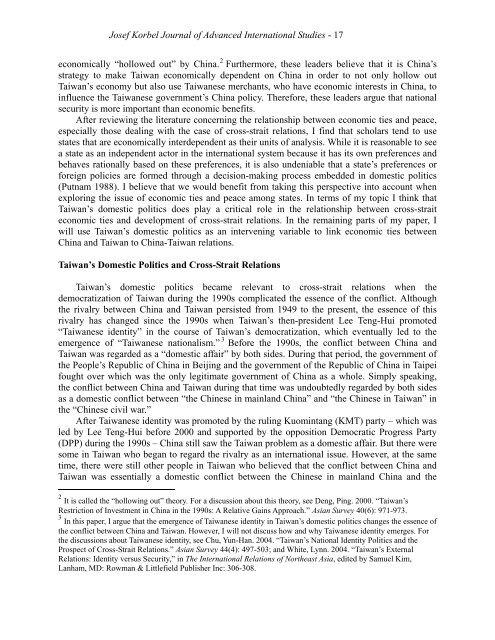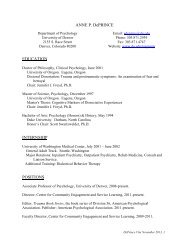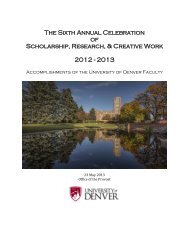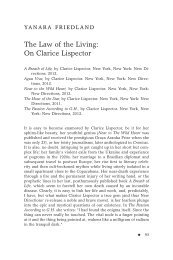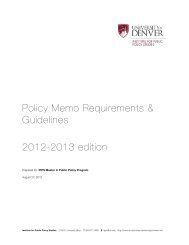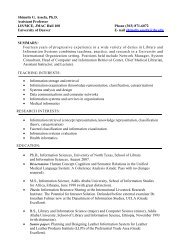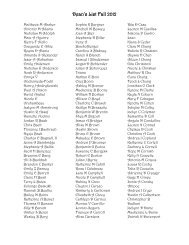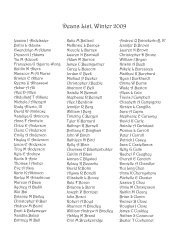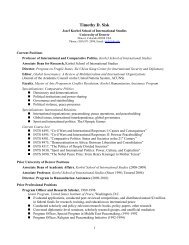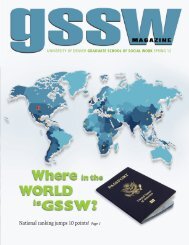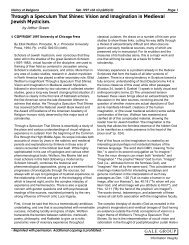Chien-Kai Chen, “China and Taiwan: A Future of Peace? A Study of ...
Chien-Kai Chen, “China and Taiwan: A Future of Peace? A Study of ...
Chien-Kai Chen, “China and Taiwan: A Future of Peace? A Study of ...
You also want an ePaper? Increase the reach of your titles
YUMPU automatically turns print PDFs into web optimized ePapers that Google loves.
Josef Korbel Journal <strong>of</strong> Advanced International Studies - 17<br />
economically “hollowed out” by China. 2 Furthermore, these leaders believe that it is China’s<br />
strategy to make <strong>Taiwan</strong> economically dependent on China in order to not only hollow out<br />
<strong>Taiwan</strong>’s economy but also use <strong>Taiwan</strong>ese merchants, who have economic interests in China, to<br />
influence the <strong>Taiwan</strong>ese government’s China policy. Therefore, these leaders argue that national<br />
security is more important than economic benefits.<br />
After reviewing the literature concerning the relationship between economic ties <strong>and</strong> peace,<br />
especially those dealing with the case <strong>of</strong> cross-strait relations, I find that scholars tend to use<br />
states that are economically interdependent as their units <strong>of</strong> analysis. While it is reasonable to see<br />
a state as an independent actor in the international system because it has its own preferences <strong>and</strong><br />
behaves rationally based on these preferences, it is also undeniable that a state’s preferences or<br />
foreign policies are formed through a decision-making process embedded in domestic politics<br />
(Putnam 1988). I believe that we would benefit from taking this perspective into account when<br />
exploring the issue <strong>of</strong> economic ties <strong>and</strong> peace among states. In terms <strong>of</strong> my topic I think that<br />
<strong>Taiwan</strong>’s domestic politics does play a critical role in the relationship between cross-strait<br />
economic ties <strong>and</strong> development <strong>of</strong> cross-strait relations. In the remaining parts <strong>of</strong> my paper, I<br />
will use <strong>Taiwan</strong>’s domestic politics as an intervening variable to link economic ties between<br />
China <strong>and</strong> <strong>Taiwan</strong> to China-<strong>Taiwan</strong> relations.<br />
<strong>Taiwan</strong>’s Domestic Politics <strong>and</strong> Cross-Strait Relations<br />
<strong>Taiwan</strong>’s domestic politics became relevant to cross-strait relations when the<br />
democratization <strong>of</strong> <strong>Taiwan</strong> during the 1990s complicated the essence <strong>of</strong> the conflict. Although<br />
the rivalry between China <strong>and</strong> <strong>Taiwan</strong> persisted from 1949 to the present, the essence <strong>of</strong> this<br />
rivalry has changed since the 1990s when <strong>Taiwan</strong>’s then-president Lee Teng-Hui promoted<br />
“<strong>Taiwan</strong>ese identity” in the course <strong>of</strong> <strong>Taiwan</strong>’s democratization, which eventually led to the<br />
emergence <strong>of</strong> “<strong>Taiwan</strong>ese nationalism.” 3 Before the 1990s, the conflict between China <strong>and</strong><br />
<strong>Taiwan</strong> was regarded as a “domestic affair” by both sides. During that period, the government <strong>of</strong><br />
the People’s Republic <strong>of</strong> China in Beijing <strong>and</strong> the government <strong>of</strong> the Republic <strong>of</strong> China in Taipei<br />
fought over which was the only legitimate government <strong>of</strong> China as a whole. Simply speaking,<br />
the conflict between China <strong>and</strong> <strong>Taiwan</strong> during that time was undoubtedly regarded by both sides<br />
as a domestic conflict between “the Chinese in mainl<strong>and</strong> China” <strong>and</strong> “the Chinese in <strong>Taiwan</strong>” in<br />
the “Chinese civil war.”<br />
After <strong>Taiwan</strong>ese identity was promoted by the ruling Kuomintang (KMT) party – which was<br />
led by Lee Teng-Hui before 2000 <strong>and</strong> supported by the opposition Democratic Progress Party<br />
(DPP) during the 1990s – China still saw the <strong>Taiwan</strong> problem as a domestic affair. But there were<br />
some in <strong>Taiwan</strong> who began to regard the rivalry as an international issue. However, at the same<br />
time, there were still other people in <strong>Taiwan</strong> who believed that the conflict between China <strong>and</strong><br />
<strong>Taiwan</strong> was essentially a domestic conflict between the Chinese in mainl<strong>and</strong> China <strong>and</strong> the<br />
2 It is called the “hollowing out” theory. For a discussion about this theory, see Deng, Ping. 2000. “<strong>Taiwan</strong>’s<br />
Restriction <strong>of</strong> Investment in China in the 1990s: A Relative Gains Approach.” Asian Survey 40(6): 971-973.<br />
3 In this paper, I argue that the emergence <strong>of</strong> <strong>Taiwan</strong>ese identity in <strong>Taiwan</strong>’s domestic politics changes the essence <strong>of</strong><br />
the conflict between China <strong>and</strong> <strong>Taiwan</strong>. However, I will not discuss how <strong>and</strong> why <strong>Taiwan</strong>ese identity emerges. For<br />
the discussions about <strong>Taiwan</strong>ese identity, see Chu, Yun-Han. 2004. “<strong>Taiwan</strong>’s National Identity Politics <strong>and</strong> the<br />
Prospect <strong>of</strong> Cross-Strait Relations.” Asian Survey 44(4): 497-503; <strong>and</strong> White, Lynn. 2004. “<strong>Taiwan</strong>’s External<br />
Relations: Identity versus Security,” in The International Relations <strong>of</strong> Northeast Asia, edited by Samuel Kim,<br />
Lanham, MD: Rowman & Littlefield Publisher Inc: 306-308.


